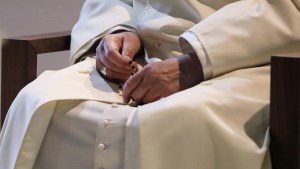In the preface to a pastoral guide for accompanying young couples published on June 15, 2022, Pope Francis “ardently hopes” that this first document will be followed “as soon as possible” by another on the accompaniment of couples who “have experienced the failure of their marriage and are living a new union or are civilly remarried.” The debate over whether or not to grant Holy Communion to divorced and civilly remarried people dominated the two synods on the family in 2014 and 2015, respectively.
A little more than six years after the publication of the apostolic exhortation on the family, Amoris Laetitia, the Dicastery for the Laity, Family and Life offers a guide for all those involved in marriage preparation and the pastoral care of spouses. It is published in Italian by the Libreria Editrice Vaticana.
Prefacing the document, the Pope welcomed the publication, which should also help couples through crises and moments of discouragement. But he explicitly asks that this first manual “be followed as soon as possible by another, which will indicate concrete pastoral methods and possible itineraries of accompaniment specifically dedicated to couples who have experienced the failure of their marriage and are living a new union or are civilly remarried.”
The Church, the Pontiff assures us, wants to be close to these couples “so that they do not feel abandoned and can find in the communities accessible and fraternal places of welcome, help in discernment and participation.”
Unremarried divorcees encouraged to receive communion
In this 94-paragraph manual, the case of divorced and remarried persons is mentioned only at the very end. In paragraph 93, the dicastery reminds us that “despite all the support the Church can offer to couples in crisis, there are situations in which separation is inevitable.”
This “last resort” solution must be accompanied pastorally. “It is appropriate above all to welcome and value the suffering of those who have unjustly suffered a separation, divorce or abandonment, or who have been forced by the abuse of their spouse to break off their cohabitation,” the document details, and then invites the establishment of a “pastoral ministry of reconciliation and mediation.” This could be carried out by listening centers specially created in the dioceses.
The last paragraph of the manual is devoted more specifically to the case of “divorced but unremarried” people. These people are “often witnesses of marital fidelity” who must be “encouraged to find in the Eucharist the nourishment that sustains them in their state,” the authors of the text explain.
They also recognize that few places in the Church give pastoral attention to these people who should be accompanied with solicitude, “especially when they have children. The document insists: “Their particular situation, nourished by the gift of fidelity to the sacrament of marriage, can be a witness and an example.
Young couples and priests could see in their lives “the constant presence of Christ the Bridegroom” or a faith that is present in spite of loneliness, “an ‘inhabited’ loneliness, marked by intimacy with the Lord and the link with the Church,” the dicastery said.
A reflection already carried out by bishops
The delicate doctrinal question of granted Holy Communion or not to divorced and civilly remarried persons had animated the debates during the synods on the family in 2014 and 2015. The Catechism of the Catholic Church assures that a person married to the Church who divorces and remarries civilly is in a situation of adultery. He or she cannot therefore have access to Eucharistic communion, “as long as this situation persists.”
In paragraph 305 of the apostolic exhortation Amoris Laetitia, Pope Francis wrote that a pastor could not “feel satisfied by applying only moral laws to those who live in ‘irregular’ situations. In a footnote, he referred to the participation of such people in the sacramental life of the Church “in certain cases.
Some bishops’ conferences have already given guidelines for applying the pope’s exhortation on the family. For example, in early 2017, Archbishop Scicluna of Malta and the then-bishop of Gozo, Bishop Grech – who has since become a cardinal and secretary of the Synod of Bishops – had issued a note to their priests.
“In the exercise of our ministry, we must be careful not to fall into extremes: into extreme rigor on the one hand, and into laxity on the other,” the document said, calling on priests to handle “the art of accompaniment.
The two Maltese bishops warned ordained ministers against the temptation to apply patterns: “Our role is not simply to allow these people to receive the sacraments, or to offer ‘easy recipes’, or to substitute ourselves for their conscience. Our role is to patiently help them to form and enlighten their own conscience, so that they themselves can make an honest decision before God and act according to the greatest good possible.”
This practical reflection, some ten pages long, had certainly made its way to Pope Francis’ office. A few days after its publication, L’Osservatore Romano, the official newspaper of the Holy See, gave it a good echo in its pages.


